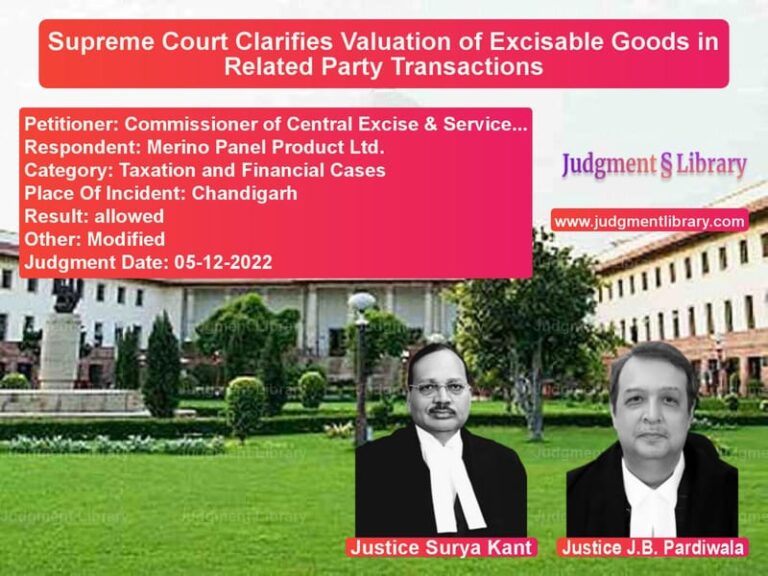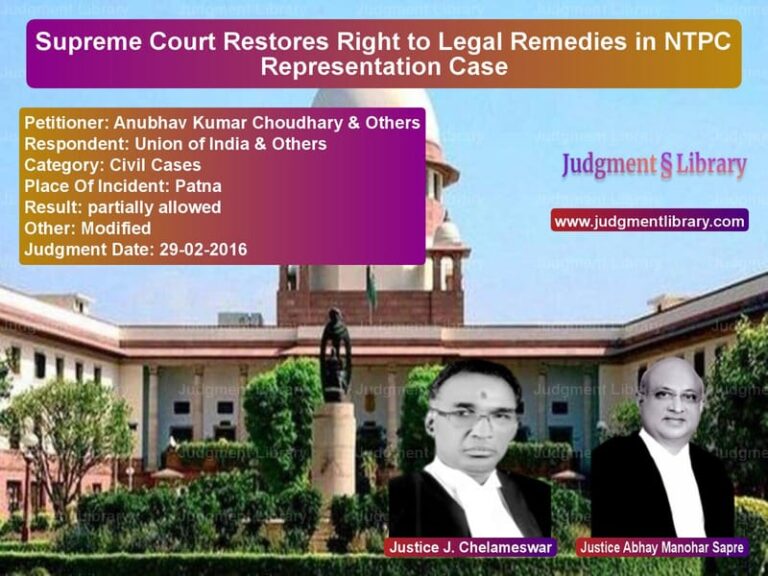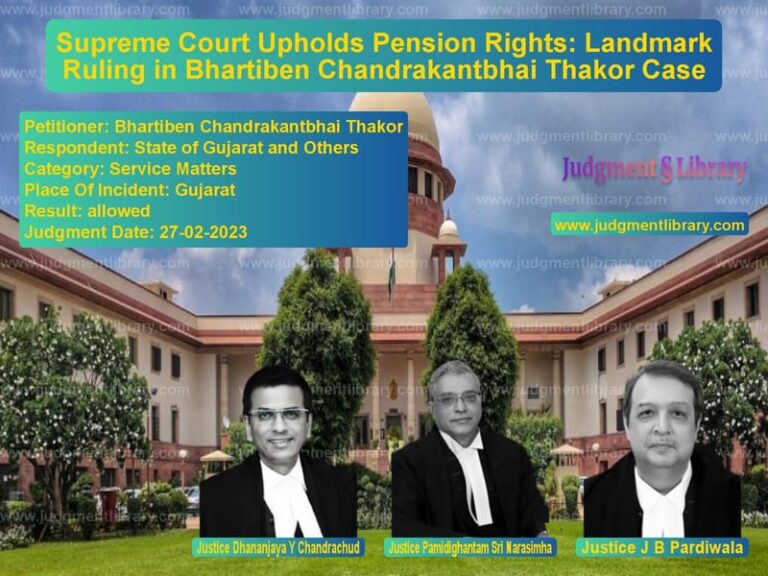Foreign Exchange Violation: Maars Software International Ltd. vs. Union of India
In a significant case concerning foreign exchange regulations, the Supreme Court of India examined allegations of violations under the Foreign Exchange Management Act, 1999 (FEMA). The dispute arose between Maars Software International Ltd. and the Union of India regarding alleged contraventions of FEMA provisions.
The case primarily involved whether Maars Software International Ltd. had failed to repatriate foreign exchange earnings within the stipulated period, thereby violating FEMA regulations. The Enforcement Directorate investigated the matter and imposed heavy penalties, which were contested by the company.
Background of the Case
Maars Software International Ltd., a Chennai-based company, specializes in software exports and enterprise resource planning (ERP) implementation. The Enforcement Directorate initiated an investigation into the company’s foreign exchange dealings following concerns about compliance with FEMA regulations.
The allegations centered around the company’s financial transactions, international dealings, and the repatriation of foreign exchange earnings. The investigation examined multiple aspects of the company’s operations, including:
- Details of the company’s directors, promoters, and their holdings.
- Formation of associated companies in India and abroad.
- Share transactions involving offshore investors, including OCBs (Overseas Corporate Bodies) and FIIs (Foreign Institutional Investors).
- Details of brokers appointed for executing business transactions.
- Loans raised for business purposes.
Complaint by the Enforcement Directorate
The Enforcement Directorate filed a complaint under Section 16(3) of FEMA, alleging violations related to the realization, repatriation, and surrender of foreign exchange as stipulated under Regulation 3 of the Foreign Exchange Management (Realization, Repatriation, and Surrender of Foreign Exchange) Regulations, 2000.
The Enforcement Directorate contended that the company had failed to adhere to Section 8 of FEMA, which mandates the timely repatriation of foreign exchange earnings. Additionally, it was alleged that Maars Software International Ltd. had not obtained the necessary permissions for any delays from the Reserve Bank of India (RBI), as required under Section 42(1) of FEMA.
Arguments by the Petitioner (Maars Software International Ltd.)
The company challenged the allegations on several grounds:
- The investigation findings were based on an incorrect interpretation of financial transactions.
- The company had submitted documentation showing compliance with repatriation requirements.
- The Tribunal had previously examined the same set of facts and ruled in the company’s favor.
- The Enforcement Directorate failed to consider relevant records before imposing penalties.
Arguments by the Respondent (Union of India)
The Union of India defended the Enforcement Directorate’s actions, arguing that:
- The company did not submit adequate proof of timely repatriation of foreign exchange.
- There were multiple discrepancies in financial transactions.
- The penalties imposed were justified based on available evidence.
- The High Court had properly overturned the Tribunal’s decision, restoring the Enforcement Directorate’s findings.
Initial Rulings and Appeals
The Special Director of Enforcement ruled in favor of the Enforcement Directorate, imposing a penalty of Rs. 4 crores on Maars Software International Ltd. and Rs. 1 crore on its Managing Director.
The company appealed this decision before the Tribunal, which ruled in its favor and set aside the penalty, directing the authorities to refund the pre-deposit amounts.
However, the Union of India challenged the Tribunal’s ruling in the High Court, which set aside the Tribunal’s decision and reinstated the penalties imposed by the Special Director of Enforcement. The High Court also dismissed the company’s writ petition seeking a refund of pre-deposit amounts.
Supreme Court’s Observations
The Supreme Court carefully examined the High Court’s findings. It noted that the High Court had ruled against the company based on an assumption that no material was produced to justify compliance with FEMA regulations.
The Supreme Court, however, found that the Tribunal had reviewed documentary evidence submitted by the company (Annexures A-15 to A-38), which detailed steps taken to repatriate foreign exchange earnings. The Court observed:
“In our considered view, keeping in view the observations made by the High Court in Para 15, it is clear that the High Court did not examine the case of the parties in the context of material placed by the appellants, though the Tribunal in Para 29 of its order has considered the said material.”
Additionally, the Supreme Court noted that the High Court seemed to have proceeded on a mistaken assumption that the company had failed to provide any supporting documents. This incorrect assumption led to the Court’s ruling being contrary to the records of the case.
Final Ruling
After reviewing the evidence, the Supreme Court ruled that the case should be remanded to the High Court for fresh consideration. The Court stated:
“In view of the foregoing discussion, the appeals succeed and are accordingly allowed. The impugned order is set aside. The case is remanded to the High Court for deciding the appeals afresh on merits in accordance with law.”
The Supreme Court clarified that it had not expressed any opinion on the merits of the case but had only remanded it for reconsideration due to procedural lapses in the High Court’s ruling.
Legal Implications
This case underscores the importance of procedural fairness in adjudicating FEMA violations. Key takeaways include:
- Adjudicating authorities must examine all material evidence before ruling on financial regulatory violations.
- Courts must ensure that factual findings are based on complete and accurate records.
- The burden of proving compliance with FEMA regulations lies with the company, but authorities must fairly assess submitted evidence.
By remanding the case, the Supreme Court ensured that due process would be followed, emphasizing that penalties under FEMA must be imposed only after a thorough examination of all relevant facts.
Petitioner Name: Maars Software International Ltd..Respondent Name: Union of India.Judgment By: Justice Abhay Manohar Sapre, Justice Dinesh Maheshwari.Place Of Incident: Chennai.Judgment Date: 22-04-2019.
Don’t miss out on the full details! Download the complete judgment in PDF format below and gain valuable insights instantly!
Download Judgment: Maars Software Inter vs Union of India Supreme Court of India Judgment Dated 22-04-2019.pdf
Direct Downlaod Judgment: Direct downlaod this Judgment
See all petitions in Banking Regulations
See all petitions in Tax Evasion Cases
See all petitions in Judgment by Abhay Manohar Sapre
See all petitions in Judgment by Dinesh Maheshwari
See all petitions in Remanded
See all petitions in Remanded
See all petitions in supreme court of India judgments April 2019
See all petitions in 2019 judgments
See all posts in Taxation and Financial Cases Category
See all allowed petitions in Taxation and Financial Cases Category
See all Dismissed petitions in Taxation and Financial Cases Category
See all partially allowed petitions in Taxation and Financial Cases Category







